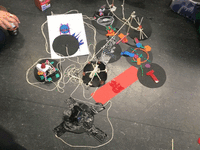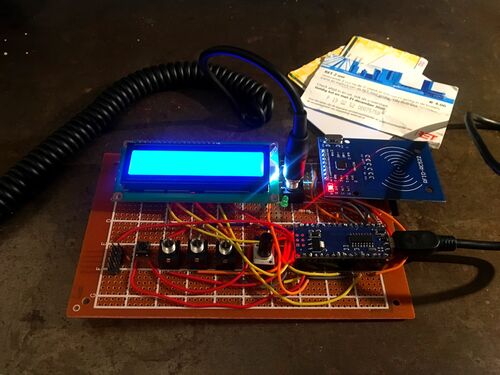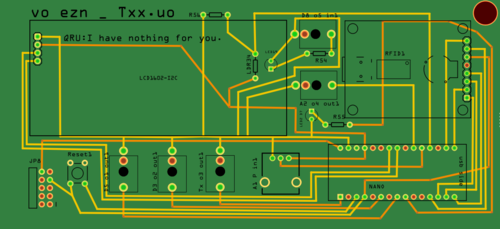User:E.zn/special issue X: Difference between revisions
No edit summary |
No edit summary |
||
| Line 11: | Line 11: | ||
==Txx.uo manual [draft]== | |||
[[File:Txx.uo_Prototype_1.jpg|500px|right]] | |||
''Txx.uo'' consolidates two contrasting radio frequency implementation modes: RFID reader scans the cards/objects with RFID tags using radio waves and LCD screen displays a Q-code* [internationally established three-letter abbreviation used in radio communication]. | |||
[[File:Txx.uo_Prototype_1.jpg|500px]] | |||
''Txx.uo'' consolidates two contrasting radio frequency implementation modes: RFID reader scans the cards/objects with RFID tags using radio waves and LCD screen displays a Q-code* [internationally established three-letter abbreviation used in radio communication]. | |||
<span>*</span>A particular Q-code denotes a question when it is followed by a question mark and references an answer [statement] when it's not:<br> | <span>*</span>A particular Q-code denotes a question when it is followed by a question mark and references an answer [statement] when it's not:<br> | ||
| Line 37: | Line 25: | ||
This module converts the data of a scanned card into a sound and binary code. The latter makes the LED blink and sends the corresponding signal to another module through an output channel. Top row of an LCD screen displays a specific question from the list of a Q-code, depending on a knob position and if the module is receiving a signal via the input jack, a random answer is shown on the second raw of the screen.<br><br> | This module converts the data of a scanned card into a sound and binary code. The latter makes the LED blink and sends the corresponding signal to another module through an output channel. Top row of an LCD screen displays a specific question from the list of a Q-code, depending on a knob position and if the module is receiving a signal via the input jack, a random answer is shown on the second raw of the screen.<br><br> | ||
[[File:PCB_Mika.png| | [[File:PCB_Mika.png|500px|right]] | ||
Revision as of 02:24, 2 December 2019
Session : Collaboration, Conflict & Consent
A two-day workshop with Eleanor Greenhalgh
- Applying various methods of decision-making and evaluating the outcomes.
- Practicing listening in teams of three [each having a specific role].
- Playing group games, like counting to 20.
- Creating a consensual artwork.
Txx.uo manual [draft]
Txx.uo consolidates two contrasting radio frequency implementation modes: RFID reader scans the cards/objects with RFID tags using radio waves and LCD screen displays a Q-code* [internationally established three-letter abbreviation used in radio communication].
*A particular Q-code denotes a question when it is followed by a question mark and references an answer [statement] when it's not:
QRU? : Have you anything for me?
QRU : I have nothing for you.
The RFID technology is used for object identification, authentication and security reasons, whereas Q-code is transmitted on a specific radio frequency by a radio operator and can be intercepted by anyone, who is tuned in to the same frequency.
This module converts the data of a scanned card into a sound and binary code. The latter makes the LED blink and sends the corresponding signal to another module through an output channel. Top row of an LCD screen displays a specific question from the list of a Q-code, depending on a knob position and if the module is receiving a signal via the input jack, a random answer is shown on the second raw of the screen.



